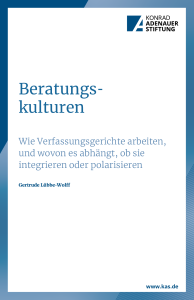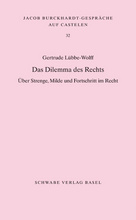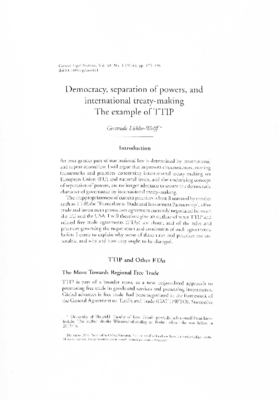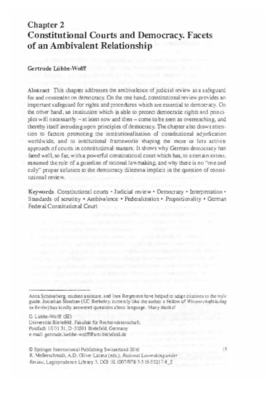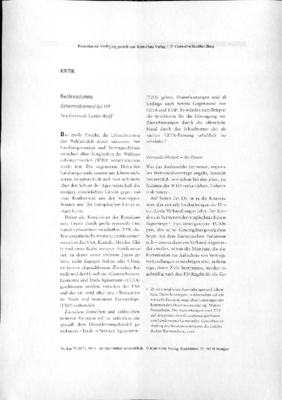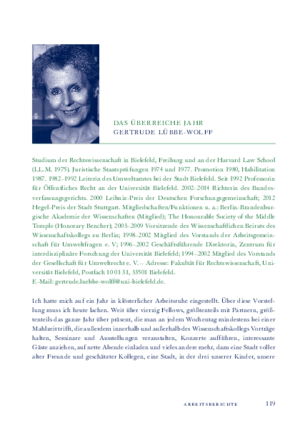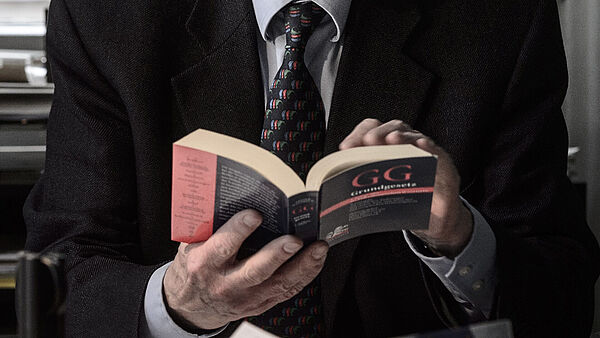
Gertrude Lübbe-Wolff, Dr. iur., LL.M. (Harvard)
Professor of Public Law
Bielefeld University
Former Judge of the Federal Constitutional Court
Born in 1953 in Weitensfeld, Carinthia, Austria
Studied Public Law, Legal Philosophy, and Modern Constitutional History at the Universities of Bielefeld and Freiburg i. Br., and at Harvard Law School
Project
Cultures of Deliberation in Apex Courts
Cultures of deliberation in apex courts, national and transnational, differ in many respects. Deliberations are prepared in quite different ways and with different degrees of thoroughness. Different courts take different amounts of time for deliberation among the judges. Some courts deliberate in public while the great majority have confidential deliberations. In many courts, judges discuss in the presence of clerks or registrars; in many others, only the judges are allowed to be present. Some courts deliberate in a very consensus-oriented manner, with elements of compromise in the decision-making process, others don't. Some courts seem more or less split into political (including ethnic or religious) factions, others seem to operate in a less politicized, more integrative manner.The project will explore such differences in a more systematic way than has been done, so far, with a particular view to identifying aspects of the institutional framework that are likely to help prevent political polarization and to contribute to constructive deliberation. This will include comparing rules and traditions concerning the composition of courts and the recruitment of judges, the role and powers of presidents, the role of non-judicial court personnel, the internal process of decisionmaking, including rules for deliberation and voting, the admissibility of separate judicial opinions etc. Besides analyses of the relevant literature, interviews with judges will help to understand how these and other framework conditions bear upon the functionality of judicial deliberation.
Recommended Reading
Lübbe-Wolff, Gertrude. Die Grundrechte als Eingriffsabwehrrechte. Baden-Baden: Nomos, 1988 (online at Leibniz Publik).
-. "Die Aktualität der Hegelschen Rechtsphilosophie." In Gestalten des Bewußtseins: Genealogisches Denken im Kontext Hegels, edited by Birgit Sandkaulen, Volker Gerhardt, and Walter Jaeschke, 328-349. Hamburg: Meiner, 2009 (online at Leibniz Publik).
-. "Homogenes Volk - über Homogenitätspostulate und Integration." Zeitschrift für Ausländerrecht und Ausländerpolitik 4 (2007): 121-127 (online at Leibniz Publik).
Colloquium, 14.06.2016
Justices in Conference: Cultures of Deliberation in Constitutional Courts
Constitutional Courts (in the broader sense, including Supreme Courts with the power to review legislation) differ in the way they produce judgments. In the US Supreme Court, for example, judges take very little time for discussion in conference, and writing decisions is not much of a collaborative enterprise. In the German Constitutional Court, by contrast, judges deliberate extensively and produce their decisions in a collaborative effort, with extensive text redaction in conference.
How do such differences come about, and what are their effects on the resulting decisions? Does deliberation matter? Are some courts more polarized (and their decisions more polarizing) than others because they don´t deliberate extensively, or are they non-deliberative as a consequence of polarization? Is deliberation associated with a search for consensus, and vice versa? Should judges, and constitutional judges in particular, aim at consensus, or should they rather voice their own opinions with a maximum of clarity and consistency, undistorted by compromise? Is compromise a political category that has no place in the making of judicial decisions? And how do institutional frameworks concerning the recruitment and status of judges, the transparency or intransparency of deliberations, voting, permission to publish separate opinions, etc., contribute to a culture of deliberation that is likely to activate the rationalizing potential of deliberation? My talk will be a report from work in progress on these questions.
Publications from the Fellow Library
Lübbe-Wolff, Gertrude (Berlin, 2022)
Lübbe-Wolff, Gertrude (Basel, 2017)
Das Dilemma des Rechts : über Strenge, Milde und Fortschritt im Recht Jacob-Burckhardt-Gespräche auf Castelen ; 32
Lübbe-Wolff, Gertrude (Baden-Baden, 2016)
Die Rechtsprechung des Bundesverfassungsgerichts zum Strafvollzug und Untersuchungshaftvollzug
Lübbe-Wolff, Gertrude (2016)
Democracy, separation of powers, and international treaty-making : the example of TTIP
Lübbe-Wolff, Gertrude (Hamburg, 2016)
Constitutional courts and democracy : facets of an ambivalent relationship
Lübbe-Wolff, Gertrude (Stuttgart, 2016)
Lübbe-Wolff, Gertrude (Göttingen, 2015)
Wie funktioniert das Bundesverfassungsgericht? Osnabrücker Universitätsreden ; Band 9
Lübbe-Wolff, Gertrude (2014)
The principle of proportionality in the case-law of the German Federal Constitutional Court
Lübbe-Wolff, Gertrude (2012)
Lübbe-Wolff, Gertrude (2011)
The Constitutional Court's relationship to parliament and government
Made at Wiko 06/21/22
Made at Wiko 03/15/17
Made at Wiko 01/17/17
Made at Wiko 08/03/16
Made at Wiko 08/01/16
Köpfe und Ideen 2016
Evidence of the Power of Judgment
a portrait of Gertrude Lübbe-Wolff by Hannah Bethke
